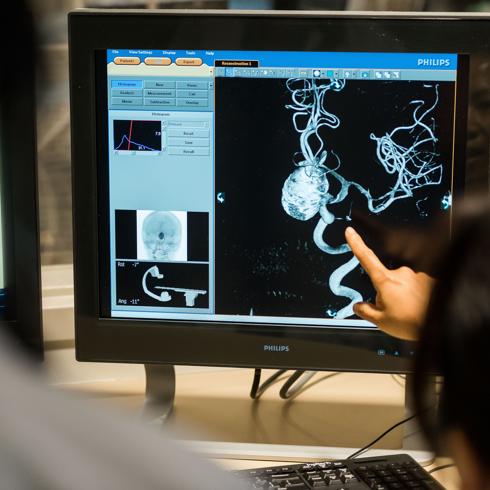BMC’s Stroke and Cerebrovascular Center is proud to be certified as a Comprehensive Stroke Center by the Joint Commission, which recognizes our ability to treat complex strokes. Our multidisciplinary team of stroke neurologists, interventional neuro-radiologists, and cerebrovascular neurosurgeons provides a full spectrum of diagnosis and treatment for patients with brain, carotid, and spinal vascular diseases.
Location and Contact
Neurology Department
7th Floor, Suite 7B
Shapiro Center 617.638.8456
Monday-Friday 8:30 a.m. to 5 p.m.
Explore the Department
Related Departments and Clinics
Neurology
Cardiovascular Center
Neurosurgery
Interventional Neuroradiology
Information You May Need
Training and Education
Neurology Residency
Trainees in BMC’s neurology residency program receive education in stroke and cerebrovascular conditions throughout the course of their training. Residents receive training at Boston Medical Center, the West Roxbury VA Medical Center and Jamaica Plain VA Medical Center.
Vascular Neurology Fellowship
The vascular neurology fellowship accepts two fellows a year for one-year experience focusing on clinical care of patients with cerebrovascular disorders. Fellows are also offered opportunities to collaborate in stroke research projects. Trainees receive extensive involvement in the diagnosis and treatment of a wide variety of stroke and other cerebrovascular disorders, with exposure to patients in the emergency room, inpatient wards, the intensive care unit, and outpatient follow-up clinic.

Stroke Research Overview
BMC is committed to furthering the evidence-based practice for cerebrovascular disease, developing protocols, and collaborating with other institutions for NIH-funded projects. BMC is a collaborating site in the NIH stroke trials network (NIH StrokeNet) and part of the regional New England Regional Coordinating Center (NERCC) and the National Institute of Neurologic Disorders and Stroke STEP program for clinical trials of thrombectomy in acute ischemic stroke.

